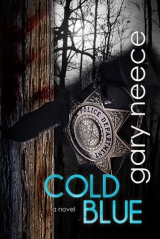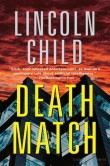
Текст книги "Cold Blue"
Автор книги: Gary Neece
Жанры:
Триллеры
,сообщить о нарушении
Текущая страница: 2 (всего у книги 21 страниц)
“What else did he tell you?”
“Just it was no coincidence the brothers got killed the same night. That’s all; he wouldn’t say no more. I think he knew he fucked up by talking about it. Every day after he told me not to say a fucking word…and I never did.”
Thorpe weighed the information. He believed Marcel was telling the truth. For one thing, he could see the devastation in Marcel’s face and in his body posture. He’d become almost demure and had substituted nearly Standard English in lieu of street talk. But most importantly, he’d just snitched on one of his best homeboys, Kaleb Moment. Marcel had to know he was bringing hell itself down on Kaleb, as his friend would soon be in a similar predicament as his own.
Thorpe leaned in. “Marcel, if you’re withholding anything else from me, a lot of people are going to have warrants served on them…courtesy of you.”
“Man, that’s it; I don’t know nothin’ else.”
“One more thing, Marcel…I’m gonna’ wipe away the word you wrote in the dirt.” Marcel’s hands were taped behind his back, inches off the dirt floor. Earlier he’d used his finger to spell “cop” behind the wooden pole. “That was very clever of you. After I wipe it away you’re going to use the same finger to write the letters ‘L.A.’” Thorpe stepped onto the word and dragged his sole across the dirt before telling Marcel to proceed.
“I’ll make sure this barn gets searched after they find your body.” Thorpe thought he caught the hint of a smile as Marcel etched the letters into the dirt floor.
“Marcel, you have two minutes to try and save your soul if you think you have one. Pray to whatever god you worship. I’ll tell you when it’s time.”
Resigned to his fate, Marcel closed his eyes and appeared to be engaged in silent prayer. Thorpe used the break to gather equipment. Two minutes later, he returned to Marcel, checked to make sure the L.A. initials were still intact, and informed him it was time.
“Marcel, earlier tonight when you approached your car, you paused and looked around. You even stared in my direction. You see or hear anything?”
Marcel turned his head toward Thorpe. He seemed genuinely contemplative before responding. “No, I just felt something. Guess I fucked up.”
Ain’t no guessing ‘bout it. Thorpe held a rag in front of Marcel’s face.
“Open your mouth. I have to remove the bolt, and it’s going to hurt like a bitch. I don’t want you screaming out.”
It must not have crossed Marcel’s mind that Thorpe could wait to remove the bolt until after he was dead. He did as he was told. But when Thorpe continued wrapping Marcel’s mouth and nose completely shut with tape, his eyes bulged with realization and fear.
“Marcel, when I told you I respected you, it was one of several lies you bought tonight. You’re a piece-of-shit child killer just like the ones I’m after. When you made peace with God, I hope you mentioned the little girl you killed.”
With that, Thorpe picked up a stray two-by-four from the barn’s floor, dropped to a knee, and swung it like a baseball bat at Marcel’s throat. Bone and meat were crushed between the board and the wooden pole. Marcel’s bound body convulsed and lurched on the dirt floor as he suffocated in his own blood.
Even as Marcel sat dying, Thorpe went to work. He cut the forward end of the bolt with his bolt cutters and used the pliers to pull the shaft through the front of the shoulder. He put all of these items in a large, heavy-duty, plastic bag. Thorpe then removed a small Ziploc plastic baggy from his pocket, used a pair of tweezers to remove a hair from inside, and placed it on the sticky side of loose tape attached to Marcel. Thorpe gathered his equipment and left Marcel’s body bound to the pole. He stepped out of the barn at 0655 hours.
Though the sky was beginning to lighten, he still had twenty-seven minutes till sunrise. Thorpe walked around the outside of the barn, wearing the different boots and using varying strides before heading south down the gravel road. Before he reached the gate, he stepped a few yards to the east, removed the spool of fishing line from the crossbow, and concealed the weapon in vegetation. He didn’t want to be spotted with the crossbow out on the street. Thorpe didn’t care if the weapon was found—it couldn’t be traced back to him. He put the spool in his pocket and monitored the police radio as he calmly walked to his vehicle.

Monday
February 5
Afternoon
TULSA, OKLAHOMA, IS THE FORTY-FIFTH largest city, by population, in the United States. Nearly 400,000 people live within its limits—almost a million in the metro area. Originally part of Indian Territory, the city flourished when large pools of oil were discovered in the early 1900s. In 1927, a Tulsa businessman campaigned to create a highway system connecting Chicago to California. Because of his efforts, Tulsa became known as “the birthplace of Route 66.”
Today, the swath old Route 66 cuts through Tulsa is the city’s easiest place to locate “women of the night.” An archaic name, for these days prostitutes were as likely to be peddling ass during the lunch hour as any other time. If the old highway were to be renamed today, Route 69 might be a more apt description—though that particular service would undoubtedly cost extra.
Tulsa sits in the northeast corner of Oklahoma in a region known as Green Country. Unlike the western section of Oklahoma, Tulsa is surrounded by lush woodlands, lakes, and rolling landscape. The climate can change forty degrees or more in a single day. The fickle conditions prompted the famous quote by native Oklahoman Will Rogers, “If you don’t like the weather in Oklahoma, just wait a minute.”
The city itself is divided by locals into four major sections. The North Side has a predominantly black populace and is comprised of older homes and very few businesses. It’s the place most rookie police officers cut their teeth—at least those who join for the pursuits, fights, and action. The North Side is where Thorpe spent the majority of his career before supervising the OGU.
The West Side is mostly lower-income whites; the East Side is a kaleidoscope of Caucasians, Hispanics, blacks, Asians, and comprised of medium to lower-priced homes and industrial complexes. The South Side is where the money lives.
These socio-economic dynamics were the basis for S.E. Hinton’s The Outsiders, a 1960s novel pitting Greasers against Socials or “Socs.” Francis Ford Coppola would later take the high school author’s book and make it into a blockbuster movie. Today, with the proliferation of gangs and gun violence, South Side Socials keep their lily-white asses away from the North Side.
Though not immensely populated, Tulsa was bigger and busier than Thorpe wanted in his off hours. He chose to live outside the city, near the small town of Mounds, Oklahoma. His neighborhood, a twenty-five minute drive south of downtown Tulsa, consisted of fifteen homes. Each home sat on ten to twenty wooded acres. He’d moved there about seven months after his wife, Erica, and his daughter, Ella, had been murdered.
The previous home had been a museum of better times. Every square inch pierced his heart with memories. Scents lingered on hairbrushes, pillows, clothing and toys. On occasion, Thorpe would think he heard his daughter’s giggles, finding himself rushing into an empty room only to find a new depth to his misery. Even the new carpet in his daughter’s bedroom provided a constant reminder; the plywood beneath was no doubt permeated with Ella’s blood.
After their deaths, Thorpe immediately listed the home with a Realtor and rented an apartment. Not able to bear being surrounded by his family’s belongings, he also couldn’t stomach discarding them; he moved all their possessions into storage. He accepted the first offer on his house and took a huge loss. He wanted out and knew no one would pay market price for a home in which a double homicide had recently occurred.
Secluded, his new house sat near the front of twenty wooded acres; a creek snaked its way through the property forty yards behind his home. A pine deck was built above the creek. The wooden perch was a place Thorpe spent many hours and was where he sat now, accompanied by his two German shepherds, Al and Trixie.
Thinking of his family, Thorpe felt the familiar emotional undertow start to drag him under. He’d been there too often, knowing it’d take him days to claw his way back to the surface if he allowed himself to dwell. Thorpe pushed thoughts of his wife and daughter away, instead concentrating on his environment and current predicament.
It was warm for February, but Thorpe could still feel the chill though his sweats and Under Armor. A steaming cup of coffee in his hand helped stave off the cold. Enveloped by oaks and towering pecans, the flowing creek whispered wordless poetry. Crisp, clean, air intermingled with the rich aroma of his morning brew as he scrutinized last night’s events, trying to uncover any mistakes he might have made.
Generally, there were four major pitfalls that resulted in a suspect’s undoing—first and foremost was motive, followed closely by collaboration. There’s an old saying, “Two people can keep a secret…if one of them is dead.” Nothing is truer in the snake-eats-snake world of the criminal. Over the years, several high-profile thefts had been pulled off to near perfection. The most notorious were usually burglaries or robberies of armored cars and other currency-transport systems, where the perpetrators made off with millions of dollars. Though these cases sometimes went unsolved for weeks or even years, invariably one of the suspects would do something stupid that brought the spotlight down on everyone else. The thieves might live above their means with no explanation for their newfound wealth, or feel the need to brag about what they “got away with” to a buddy or girlfriend. Or, they might get busted for something unrelated and turn witness to avoid prison time. Thorpe knew collaboration would be the downfall of his family’s murderers. One or more of them had already spoken about it, the information filtering down to Marcel from Kaleb Moment and now to Thorpe.
Physical evidence constituted the third pitfall, especially damning in the era of DNA. One hair follicle left at a crime scene was all it took. Blood, semen, saliva, fingerprints, bite marks, tool marks, ballistics—the list nearly infinite.
Pitfall number four—witnesses. Witnesses were not reliable and in today’s courtroom the easiest piece of evidence to discredit. Thorpe had responded to many a scene to find supposed witnesses giving irreconcilable descriptions of the same suspect. Those witnessing stressful events were especially prone to making misidentifications. DNA testing had exonerated numerous suspects who had spent years in prison based on the testimony of “reliable” eye witnesses. Rape cases, where victims experience extreme amounts of stress, were some of the most common convictions overturned by DNA evidence. Even trained and experienced police officers were not immune to these errors.
When officers are involved in a stressful event such as a shooting or a high-speed chase, huge amounts of adrenaline are dumped into the body. The mind is essentially under the influence of chemicals meant to help the individual survive, but they also alter perception. Studies have shown officers involved in high-speed pursuits experience similar physiological symptoms as a soldier in the midst of combat. At the pursuit’s conclusion, officers aren’t able to just switch off these “fight or flight” chemicals; the pursuing officers are literally drugged. The results are spectacles on the ten o’clock news a la Rodney King. Anyone who was a police officer prior to that fiasco knew that if a suspect ran, the law and an ass whippin’ were going after him.
Thorpe figured eventually he himself would be discovered. He didn’t have to worry about collaborators and was reasonably certain there were no witnesses who could provide anything valuable. But he had motive. And one just never knew if physical evidence had been left behind—regardless of the precautions taken.
He doubted his motive could be tied to Marcel, at least not at this point. Marcel had nothing to do with his family’s murder except for hearing something he shouldn’t have. Thorpe had gotten lucky. He hadn’t a clue if Marcel was in the know. Thorpe had chosen five killers in the Tulsa area; five gangbangers who swam in the information stream of Tulsa’s underworld; five men who deserved to die and who he’d have little remorse killing even if it turned out they had no useful knowledge. He’d considered the possibility of killing all five thugs and still not acquiring anything of use. Instead, he’d found a starting bock with his first target. Marcel had given-up someone who knew something, his best friend Kaleb Moment. Now Thorpe had direction. But with each kill the connection would grow stronger between his family’s killing and the ones Thorpe would be committing. Thorpe might become a suspect, but hopefully not until all those responsible for his family’s death had been put in the dirt. Even then, a colossal distance separated suspicion from conviction.
Physical evidence was another matter. Thorpe had taken steps to avoid leaving incriminating DNA, while at the same time planting items of misdirection. He kept his hair short, had covered his body, and shaved his goatee prior to his visit with Marcel. Still, one dog hair transferred from his clothing to the crime scene would be enough to link him if he ever became a suspect. However, he had a reasonable excuse if that scenario arose. Because of his job, Thorpe had legitimate contact with most potential “victims” prior to engaging them. Tonight, he would dispose of many of the tainted items from last night’s encounter with Marcel. He also had one more piece of misdirection to plant, contingent upon Marcel’s body remaining undiscovered for a bit longer.
Thorpe heard the crunching and popping of laden rubber on gravel as he turned his head to watch a gleaming silver Toyota 4-Runner dock in his driveway. It was Jeff, his good friend and old partner. Jeff Gobin stood no taller than Thorpe but weighed a good forty pounds heavier. When Thorpe and Jeff suffered through the academy together they’d weighed about the same. Today they probably carried similar amounts of muscle on their frames, but Jeff sheltered his with an insulating layer of fat. Jeff was in excellent shape; he just enjoyed his pizza, spaghetti, fettuccini, and anything else Italian. Though black, if one had to guess Jeff’s ethnicity based solely on stomach contents, one would likely surmise he was fresh-off-the-boat from Sicily. They were no longer partners, but they remained close. Following the murders, Jeff often checked up on Thorpe. The last few months, and nearly daily, he’d been visiting Thorpe’s property to exercise. Jeff probably thought himself a Good Samaritan by venturing out to Thorpe’s compound as his friend liked to refer to it, but Thorpe figured he visited as much for his own mental stability as anything else. He rarely complained, but Jeff wallowed in a not-so-happy marriage.
Thorpe rose from the deck and walked to a large metal barn about fifty yards west of his home. The modern structure measured 24 X 20 and was outfitted with double doors, a loft, steel support, and stained concrete floors. Thorpe appointed it with weights, a heavy bag, wrestling mat, and various pieces of equipment catering to Crossfit regimens.
“What the fuck are you smiling at?” Jeff remarked, without a smile of his own.
“I’m thinking of the ass whipping you’re about to get,” Thorpe said as he opened a pedestrian door beside the larger double doors.
“Why are you always talking about my ass? There something you want to share with me?”
“Huh, your ass ain’t bad, but your boobs are a little big for my taste,” Thorpe joked.
“Fuck you.”
That was how their pleasantries usually went. A transcribed conversation between the two would read like two sworn enemies thrown in a very small room together. It was how most police officers talked to each other; if a fellow cop wasn’t giving you shit, then he probably wasn’t your friend.
Thorpe pushed open the double doors. Having been trained, Al and Trixie remained outside.
“Jeffro, it’s chest day. Let’s try to firm up those man boobs of yours. Otherwise I’m going to have to buy you a manssiere.”
Jeff smirked and displayed his middle finger.
Following strength conditioning, he and Jeff began thirty minutes of cardio circuit training that involved jumping rope, working the heavy bag, and scrambling on the mat. During the workout, last night’s conversation with Marcel kept looping through Thorpe’s mind. The trigger-pullers were already dead, but it was obvious there had been a more sinister undertaking than a burglary gone bad. Someone had sent the Davis Brothers, someone who would pay dearly. Thorpe’s workout intensity rose to meet that of his rage, until he collapsed on the mat, rolled over, and vomited on the smooth concrete.
Thorpe had always exercised, but since his family’s death he’d immersed himself in his workouts. The physical exertion would, temporarily at least, help dull his emotional torment. Pain, adrenaline, and a mission—Thorpe’s version of an alcoholic drinking himself numb.
“Damn, John, that’s why I don’t want to spar with you anymore. That shit ain’t normal.”
“People puke all the time when they work out,” Thorpe sputtered—still hunched over the concrete.
“Yeah, when they got Bobby Knight all over their ass. Not when they’re working out at their own home.”
“I didn’t throw up from my workout,” Thorpe smiled. “I got sick from watching your man boobs flop around inside that nasty shirt of yours.”
“Have I told you to fuck off lately?”
“Yeah, couple times.”
“Good.” Then Jeff added, “Brother, you need to go see someone before this shit kills you.”
“I’m working it out… it’s getting better.”
“You say so.”
Jeff was with Thorpe when he first met his wife, and he’d tried to be with him as much as possible ever since her death. The chance meeting occurred seven years before. At the time Thorpe was twenty-eight years old and enjoying the bachelor life. He’d been on the force for several years, had not yet been promoted, and was working as a Strategic Oriented Police Officer (SOPO). There were six SOPOs assigned to Gilcrease Division. SOPOs were selected because they demonstrated a proficiency at tossing shitheads in jail. Their assignment: put out fires across the city; if a particular area experienced a high amount of violence or drug trafficking, it was the SOPO’s job to come in and quell the criminal element. Tulsa police officers generally operate solo but because of the inherent danger of their assignment, SOPOs worked with a partner.
One Saturday night in August, Thorpe and Jeff were patrolling outside a downtown Tulsa nightclub—the site of several late-night shootings. They were conducting checks on a couple of pedestrians dressed out in gang colors, when Jeff observed two ladies exit an adjacent bar and head toward a parking lot. Thorpe noticed Jeff’s attention shift and followed his partner’s gaze. Even at fifty yards, both officers could tell the women were attractive, attractive enough that both Thorpe and Jeff forgot the term “officer safety,” distracted by four sauntering, slender, white-stocking-adorned legs. The gangbangers could have clubbed both officers over the head like baby seals had they wanted. But their attention had also been drawn to the women. It must have been quite a sight: two uniformed officers standing next to a couple of dressed-out “Red-Teamers,” all four of them drooling on themselves like best friends and fellow deviants.
The ladies walked west down First Street and rounded a corner heading north into a darkened parking lot and out of sight. Thorpe was returning his attention back to matters at hand when he observed two men across the street near where the women had passed. One of the men elbowed his buddy in the ribs and nodded in the direction the women had gone. The men began to follow. Thorpe looked at Jeff and could tell by the look on his partner’s face he shared the same concern. Jeff returned the I.D.s to the bangers, and both officers jogged toward the area where the women and their stalkers had disappeared.
When Thorpe rounded the corner, he saw the women near a red BMW. One of the men was just catching up with the women from behind. He estimated the guy to be about five-ten, a couple hundred pounds, and highly intoxicated. The man, doing his best impersonation of a drunken ninja, snuck up behind the nearest woman and lifted her black pleated skirt. The woman spun on her attacker and attempted a wide, right-handed slap, but Drunken Ninja was sober enough to catch her right wrist with his left hand and push her up against the car. The two drunks then began saying things only inebriates think are clever. The second, smaller man began maneuvering toward the other almost equally attractive woman.
Thorpe had come up behind Drunken Ninja, who had a hold on both the woman’s wrists. The woman caught the movement and glanced over her assailant’s shoulder at Thorpe. The man, a little sharper now because of an adrenaline rush, recognized someone must have been standing behind him. Drunken Ninja stepped back with his left foot, spun, and took a right fisted swing that began somewhere near the Canadian border. Instead of backing away from the telegraphed punch, Thorpe stepped into and underneath it, driving Drunken Ninja’s body over his shoulder. Thorpe lifted the man off the ground and had him draped across his shoulders in a fireman’s carry. Though not taught in any respectable martial arts dojo, it’s a move handed down from every father to every son, a move to use on your buddies when you’re horsing around, especially effective when they’re drunk. It’s not a practiced law enforcement tactic, for good reason, but Thorpe was showing off a little. He gave the drunk a “helicopter ride,” spinning him rapidly through the air.
Thorpe released the man mid-flight. Drunken Ninja was unable to activate his landing gear and skidded across the lot via his stomach and forearms. And, just like any self-respecting drunk, Ninja stood to address the threat. Unfortunately for him, his world was spinning out of control and he couldn’t keep his feet. Drunken Ninja began staggering to his right, and instead of just falling down (and saving himself further embarrassment), he picked up speed as he tried to stay upright. He took several sideways running steps before plowing headfirst into the tailgate of a blue, Ford F-150, knocking himself unconscious.
The woman in the skirt had just been in tears but began laughing as she looked down on Drunken Ninja, who emptied his bladder through his jeans onto the gravel lot.
Before long, all those still conscious were laughing—even Drunken Ninja’s drunken sidekick. When the amusement faded, his lady in distress, Erica, looked up at Thorpe, and he could see it in her eyes: she was enamored.
One week later, he picked up Erica for their first date. For the occasion, she wore a white lace cami with plunging neckline and bare midriff. Her long legs blossoming from a short skirt, she looked, smelled, and oozed sex. The date began with dinner and drinks before Erica suggested going to a large country and western bar located near the center of Tulsa’s city limits. Not fond of crowded bars he couldn’t resist the prospect of slow dancing with the beauty seated next to him; her toned legs presented a convincing argument. Shortly after, Thorpe found himself on an overflowing dance floor with Erica pressed against him. The couple lasted all of two songs before he invited her back to his place. By the time he turned the key to his apartment and pushed open the door, they were pulling at one another’s clothes. The two fell into the apartment and a lovemaking session. They never made it past the front room.
After their first date, they began seeing each other regularly, but not exclusively. Sex was the glue holding the relationship together. He didn’t know if Erica had fallen for him but knew she at least had a deep infatuation. Sometimes he wondered if she wasn’t just attracted to the potential for violence she had witnessed when they first met. Some women craved that. Everyone has seen them—the woman with the fashion model looks hanging on the arm of a Kid Rock lookalike. One thing Thorpe knew for certain; he wasn’t in love with Erica. In fact, he’d never been in love with any woman and had his doubts whether he had the capability.
A couple of months after their first date, Thorpe decided he’d better call off the relationship. Prepared to break the news to Erica, she had a surprise of her own; she was pregnant. They’d been careful, but these things have a way of happening. Erica seemed genuinely happy with the prospect of motherhood, and after the initial shock, Thorpe did his best to appear optimistic. Raised to accept responsibility for his actions, and though today’s experts would probably discourage marrying because of an unexpected pregnancy, Thorpe felt it was the only thing to do.
Erica came from money—old money. Her father, Phillip Hessler, made no attempt to hide the fact that he disapproved of the man who’d “knocked-up” his baby. He had higher aspirations for his daughter. Thorpe figured the man had hoped for an Ivy League investment banker as a future son-in-law, not some knuckle-dragging civil servant with a gun. The two married in a large downtown Methodist church with Erica clearly showing in her white wedding dress. When the father gave his daughter away, he did so with a glare that should have burned a hole right through Thorpe’s rented tuxedo. The relationship with his in-laws would never improve.
Thorpe, in the delivery room on the night Ella was born, didn’t experience any of those overwhelming emotions other fathers describe when excitedly recalling the births of their children. He made sure he said all the right things and smiled on cue. Two days later, mother and child came home to the apartment. Erica didn’t feel well, and Thorpe was burdened with the majority of childcare. One short week of tending to Ella—the diaper changing, the bottle feedings at 3 a.m., the standing over the crib to make sure the baby still drew breath, the worrying that comes with caring for something so small, fragile, and, yes, precious—had broken Thorpe down.
He loved his little girl more than anything he had loved in his entire life. Childcare wasn’t a burden any longer; it was a privilege. This innocent baby, Ella, looked to Thorpe to take care of her, and that’s just what he planned to do. Thorpe wasn’t the only one changed by being a parent. Erica settled down, and, to his surprise, turned out to be an excellent mother. As Ella grew, so did the relationship between Erica and Thorpe. He might not have been in love, but his caring deepened. Thorpe’s love for Ella, however, grew beyond even his own comprehension. He knew if he lost her, he too would be lost forever.
FOLLOWING THEIR WORKOUT, JEFF LEFT Thorpe’s property more concerned than when he’d arrived. When they’d partnered together, they spent upwards of eight hours a day with each other five days a week and had often hung out on their off days. When you’ve spent that amount of time with a person, you damned well got to know him. Maybe not his history, if he were unwilling to share. But you reach a point where you knew another person’s thoughts, even if the words weren’t spoken.
Jeff sensed a shift within Thorpe. He’d already been close to becoming unhinged, but now there was something…new. Jeff couldn’t quite pinpoint what it was but decided he’d be keeping a closer eye on his best friend.








